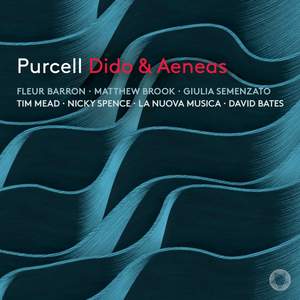PURCELL Dido and Aeneas (Bates)
View record and artist detailsRecord and Artist Details
Genre:
Opera
Label: Pentatone
Magazine Review Date: AW23
Media Format: CD or Download
Media Runtime: 58
Mastering:
DDD
Catalogue Number: PTC5187 032

Tracks:
| Composition | Artist Credit |
|---|---|
| Dido and Aeneas |
Henry Purcell, Composer
(La) Nuova Musica Avery Amereau, Sorceress, Contralto David Bates, Conductor Fleur Barron, Dido, Mezzo soprano Giulia Semenzato, Belinda, Soprano Helen Charlston, First Witch, Mezzo soprano Hilary Cronin, Second Lady, Soprano Martha McLorinan, Second Witch, Mezzo soprano Matthew Brook, Aeneas, Bass-baritone Nicky Spence, Sailor, Tenor Tim Mead, Spirit, Countertenor |
Author: Alexandra Coghlan
The domestic, small-scale associations of Purcell’s Dido and Aeneas with a girls’ school in Chelsea cling persistently to the composer’s most famous work. Lindsay Kemp’s booklet notes for this new recording by David Bates and La Nuova Musica tease out a more complicated performance history, both at court and later (albeit in fragments) on the professional stage. Bates and his musicians make a similar case for a score that’s presented here with striking scope and dramatic stature – and more than a glance towards European operatic traditions of the period.
It all starts with the voices. Bates has assembled a heavyweight cast, including cameos from Nicky Spence (Sailor) and Tim Mead (Spirit), with mezzo Helen Charlston (a recent Dido for Les Arts Florissants) a luxurious First Witch. But the tone is set by Fleur Barron in the title-role. The Singaporean-British mezzo leans into the role’s tragic scope; when she speaks of ‘torment’ it doesn’t just throb but shakes Purcell’s ground bass until it seems like the melodic circle can never close again. There’s no fear of colouring outside the lines, and her Dido – generously shaded and gestural – refuses to be confined, packing five acts of tragedy into the opera’s short scope.
Giulia Semenzato’s Belinda is balanced to match Barron, rich and brilliant rather than lithe, and often intricately ornamented (though diction does suffer a little), blending effectively with Hilary Cronin’s dark-toned Second Lady. Avery Amereau brings plenty of expressive inflection to the Sorceress, sitting just the right side of panto: idly, mischievously malignant rather than tipping into madness, stylishly supported by Charlston and Martha McLorinan as her Witches. Only Matthew Brook’s Aeneas feels out of place in this plausible psychodrama, bluff and avuncular rather than an ardent lover.
But it’s the orchestral playing and colouring where this recording really comes into its own. Small touches – the breathy softness of the strings at the start of the Overture, gradually coming into brighter focus; the unexpected gleam of a harp; or an all-out groove for guitar, percussion and continuo leading into ‘Oft she visits’ – bring storytelling into sharp focus, constantly pulling the ear towards new details. Choral singing is tight and tidy, better suited to celebration than wicked scheming – the only overtly English aspect of this theatrical, big-boned performance that shows Bates and his ensemble at their best.
Discover the world's largest classical music catalogue with Presto Music.

Gramophone Digital Club
- Digital Edition
- Digital Archive
- Reviews Database
- Full website access
From £8.75 / month
Subscribe
Gramophone Full Club
- Print Edition
- Digital Edition
- Digital Archive
- Reviews Database
- Full website access
From £11.00 / month
Subscribe
If you are a library, university or other organisation that would be interested in an institutional subscription to Gramophone please click here for further information.




